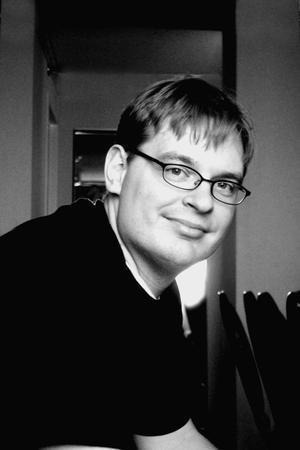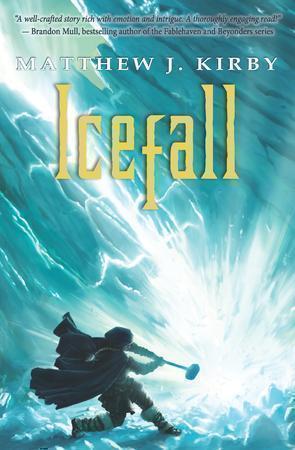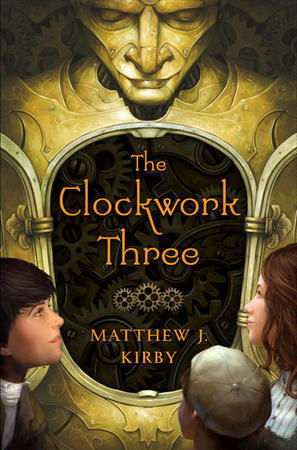
Matthew J. Kirby is the author of “Icefall” and “The Clockwork Three.” Below is a complete Q&A transcript from his interview with Cracking the Cover.
Where did the idea for “Icefall” come from?
ICEFALL had its beginnings in a brief but vivid dream in which I saw three children clinging to each other in a remote fortress. It was winter, and cold, and outside the fortress an army of warriors approached. But I knew the warriors were the good guys and had been sent to protect these three children. And yet, the children were terrified of them.
Then I woke up. But the feeling of the dream lingered, a frigid claustrophobia, and I began trying to make sense of it all. Who were the children? Why were they there in that fortress? Who were those warriors, and if they were sent to protect the children, why were the children afraid of them? The answers to these questions led me to Solveig and her story.
Briefly tell me a little about it.
Solveig is the plain and undervalued daughter of a Viking king. During a time of war, Solveig is sent away with her brother and sister to a remote fortress for their protection, along with a few trusted servants and a company of her father’s elite warriors. Winter soon seals them all in together, and before long it becomes apparent that a traitor has been sealed in with them. As with my first book, ICEFALL is a blend of genres. It’s a survival story, and a mystery, with mythic elements interwoven as Solveig awakens to her talent as a storyteller.
“Icefall” is your second book. How did the process differ from writing “Clockwork Three”?
The main difference for me was the voice. THE CLOCKWORK THREE is told from a third-person point of view, limited but at a slight remove, rotating among the three main characters. But I knew from the beginning that Solveig’s story would be told in first-person. I was very fortunate that she began speaking to me early on. In fact, her voice was one of the first elements of the story to present itself. The beginning few pages of the book remain almost exactly as I wrote them the first time through.
The two books are so different. Did you have a hard time switching gears?
Not as hard as I initially feared it would be. In the beginning, I didn’t even think Solveig’s story was one I could write, and I avoided it for several weeks and worked on other things. But Solveig kept coming to me, unbidden, and more and more of her story unfolded in my mind. And then I came across a piece of advice M. T. Anderson gave to Kathi Appelt, but which also spoke to me. He said, “Write what you think you can’t.” That really struck me, and I suddenly knew that even though I feared I couldn’t write Solveig’s story, I had to try. So I called my agent, told him I was thinking of doing something different, and he gave me the final bit of encouragement I need to dive in.
Norse mythology is weaved throughout “Icefall.” How did you adapt those myths to work within your story?
The mythology was actually one of the harder aspects of the book to manage. It was a constant negotiation between the need for authenticity, and accessibility. I wanted to present this mythic worldview in a way that was true to it, but I also wanted readers to be able to relate to it. So those parts of the book probably went through the most revision. For example, in the first draft, Solveig and Alric told their stories in poetic form, and I did my best to replicate the structures and devices of Norse verse. But we realized that modern readers probably wouldn’t be able to relate to them well enough, so I switched to prose. Hopefully, I’ve struck the right balance such that readers will feel they’ve experienced a time and place that are foreign, but in some way also familiar.
 Did studying history as and undergrad help?
Did studying history as and undergrad help?
Absolutely. Not specific to ancient Norse culture, which I never studied as an undergrad, but more generally. I had some amazing teachers at Utah State University, like Dr. Norm Jones, who heads the history department there. He taught me how to study and read history, and with those foundation skills I feel able to approach an historical subject I might want to write about. And I love the research.
How long did you work on “Icefall”?
Well, from the time I began writing the first draft to the time I finished revisions with my editor, I think it was about one year, the bulk of it over one summer. We had a new puppy at the time, and I used to take him outside in the back yard with my laptop. He’d run around playing and rolling in the grass, and I’d write in the shade. It always seemed funny and odd to me to be writing about this frozen setting while I was sitting there in a lawn chair wearing shorts.
Who is your favorite character in the book? Why?
I love all the characters for different reasons, but if forced to choose I would have to say my favorite is Solveig.
Why? It is her story, so she has the home field advantage.
You’ve said you don’t think of yourself as a writer who writes with a message. So what do you hope readers will get out of “Icefall”?
I’m a believer in the power of story as an organizing and essential part of the human condition. So I suppose that one thing I hope readers take from ICEFALL is something I gained as I wrote it, namely, a renewed appreciation for the power of story in our lives, as we experience Solveig’s journey as a storyteller.
“Clockwork Three” received a lot of praise and there’s been a big buildup for “Icefall.” Are you surprised by the response?
I’m very surprised. And grateful and pleased beyond words. As I mentioned, I wasn’t even sure I could write this book, and even if I could, I wasn’t sure anyone would want to read it. So to receive such an enthusiastic response has been tremendous.
What are you working on now?
Right now, I’m finishing a Colonial American fantasy. It’s sort of a Jules Verne-esque adventure, and in terms of scale it’s more sprawling and epic than my previous two books. After that, I’ve got something secret in the works, and I’ll hopefully be able to announce it soon.
 Looking back, how has your writing evolved from when you first started until now?
Looking back, how has your writing evolved from when you first started until now?
I suppose one thing I’ve learned is that I really enjoy trying new things. I like challenging myself, and stretching. Every book feels to some degree like starting over, figuring out a new way to tell a new story, and I hope that never goes away.
Do you still works as a school psychologist? How have the students responded? What books do you recommend to them?
I do still work as a school psychologist, and it’s been a lot of fun since THE CLOCKWORK THREE came out last year. I’ve started doing school visits, which I really enjoy. But the most meaningful interactions have been with the students in the schools where I work every day. They come by my office, and they stop me in the halls to tell me they’re reading the book, or they’ve read it, and I get to talk with them and answer their questions. As far as books I recommend to them, I usually suggest the authors I loved when I was their age: Ursula K. Le Guin; Natalie Babbitt; Elizabeth George Speare; Sid Fleischman; J. R. R. Tolkien.
Is it hard balancing a full-time job and writing?
Much harder than I thought it would be. I actually don’t know how much longer I’ll be able to keep it up. I love my work as a school psychologist, but writing has always been my passion and my dream since I was about twelve years old, and I look forward to the day I can give all my time to it.
Out of curiosity, are you still using the laptop your wife gave you for Christmas while attending at USU?
Sadly, no, though I have hung onto it. It gave up the ghost a few years ago, and went to wherever it is that the spirits of well-loved and oft-used computers go.
